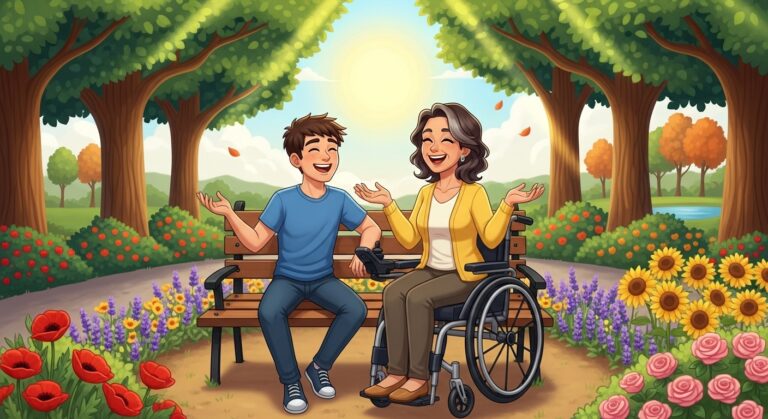In a small, sun-drenched town, where the rustling leaves whispered secrets and the air was thick with the scent of blooming jasmine, lived a young man named Ethan. At just 22 years old, Ethan found himself thrust into the role of caretaker for his mother, Sarah, a vibrant woman who had been struck down by a series of unfortunate medical crises. Once a spirited soul known for her infectious laughter, Sarah had suffered multiple brain hemorrhages and a catastrophic stroke that left her with profound disabilities. Now, she struggled to walk more than a few meters, her words often tangled in a web of confusion, and at times, she didn’t even recognize the son who had devoted his life to her care.
Since his early teenage years, Ethan had taken on the mantle of caregiver, navigating the tumultuous waters of his mother’s illness with grace and resilience. He had tried to enlist the help of professional caregivers, but Sarah’s unyielding temper and biting words drove each of them away, leaving Ethan as her sole guardian. As the years rolled on, the burden of responsibility grew heavier, pressing down on his shoulders like an anchor tethered to the ocean floor.
Despite his unwavering devotion, Ethan’s own health began to crumble under the weight of his circumstances. Diagnosed with several mental health conditions, including schizophrenia, psychosis, and ADHD, he faced daily battles that felt insurmountable. The once-bright spark of life within him dimmed as he poured every ounce of energy into caring for his mother, often neglecting his own needs and well-being. The joyful moments they once shared were now overshadowed by the relentless demands of caregiving, and he found himself standing on the precipice of despair.
One fateful evening, as the sun dipped below the horizon and painted the sky in hues of orange and purple, Ethan made a decision that would change everything. He realized that he could no longer sacrifice his own mental health for the sake of someone else. It was a painful realization, one that felt like a betrayal to the love he held for his mother. But deep down, he understood that to be a better son, he needed to first be a better version of himself.
With a mix of trepidation and determination, Ethan began to step back from his role as a full-time caregiver. He sought therapy and support groups to help him navigate his mental health struggles. Slowly, he started to prioritize his own well-being, carving out time for hobbies he’d long forgotten, like painting and hiking. Each brushstroke on canvas was a step toward healing, each footstep on the trail a reminder that he was reclaiming his life.
However, this newfound independence did not come without its challenges. As Ethan distanced himself from the day-to-day responsibilities of caring for his mother, his family erupted in a chorus of disapproval. They accused him of being selfish, of abandoning Sarah in her time of need. “How can you turn your back on her?” they would say. “You’re all she has left.” Their words pierced through him like arrows, igniting feelings of guilt and shame.
Ethan grappled with these emotions, wrestling with the idea that perhaps he was indeed heartless for prioritizing his own needs. But with each therapy session, he began to understand that self-care is not selfish; it is a necessary foundation for love and support. He learned to set boundaries, to communicate openly with his family about his struggles, and to advocate for the assistance Sarah truly needed.
With the help of social services, Ethan was able to secure a compassionate caregiver who could manage Sarah’s needs with the patience and understanding that he had been unable to provide. This new caregiver, a warm-hearted woman named Maria, quickly formed a bond with Sarah, bringing laughter back into the home that had felt so heavy for so long.
Ethan’s journey was not without its bumps. There were days when self-doubt crept in, when guilt threatened to drag him back into the depths of despair. But through it all, he learned to celebrate the small victories—the moments when he could enjoy a meal with friends, laugh at a silly movie, or simply sit outside and feel the sun on his face without the weight of the world on his shoulders.
As the months passed, Ethan found a delicate balance between caring for his mother and caring for himself. He learned to visit Sarah regularly, sharing stories and laughter, but he also carved out time for his own life, forging connections with others who understood his struggles. His family began to see the changes in him; the light in his eyes returned, and his laughter echoed through the walls of their home once more.
One day, while sitting in a sunlit park with Sarah, Ethan realized that stepping back hadn’t meant abandoning her; it meant choosing to love her in a healthier way. He could support her while also nurturing his own soul, and in doing so, he found a newfound sense of strength and purpose.
As the seasons changed, so did their relationship. Ethan had transformed from a weary caretaker into a son who could enjoy the essence of their bond without the burdens of guilt. It was a tough journey, but it ultimately led him to a place of peace—a lesson in the importance of self-love and the realization that to truly care for others, we must first care for ourselves.





0 Comments